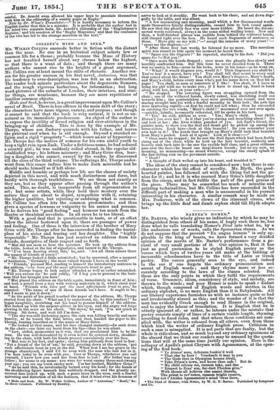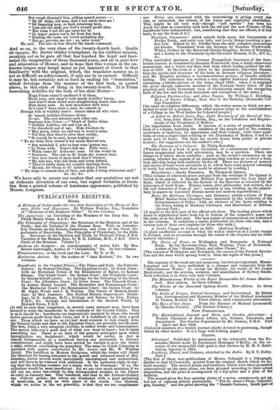BARTER'S HOMER. * Mn. BARTER, who wisely gives no indication by
which he may be distinguished from others of his name, if haply such there be, has done what he calls translating Homer's Iliad into what he' by a like audacious use of words, calls the Spenserian stanza. As we do not suppose that the proverb "Ex ungue leonem" is only ap- plicable to the king of beasts, we have formed a very decided opinion of the merits of Mr. Barter's performance from a pe- rusal of very small portions of it. Our opinion is, that it has just as good pretension to be styled Roglish poetry as the verses which boys of twelve years old make at the bidding of inexorable schoolmasters have to the title of Latin or Greek poetry. The verses generally scan to the eye, and indeed to the ear if one forgets the ordinary pronunciation and accent of English words ; and they rhyme more or less ac- curately according to the laws of the stanza selected. But these are the only points in which they fulfil the requirements of verse. Grammar, idiom, consistency of style, and melody, are thrown to the winds; and poor Homer is made to speak r dfalect which, though composed of English words and written in the ordinary alphabet, is no more English than it is Babylonish. All our literary experience furnishes us with no instance quite so bad and irredeemably absurd as this ; and the wonder of it is that the man has evidently Greek enough to read Homer in the original, and to enjoy the labour of translation. It is English that he is utterly ignorant of; or rather, he labours under the mistake that poetry consists simply of lines of a certain visible length, rhyming according to fixed rules, and that where these conditions are com- plied with, the writer is released from all others, even from those which bind the writer of ordinary English prose. Criticism in such a case is misapplied. It is not parts that are faulty, but the whole is ridiculous, and so much beyond any ordinary specimens of the absurd that we think our readers may be amused by the crota- tions that will at the same time justify our opinion. Here is the colloquy of Apollo's priest Chryses with Agamemnon, at the open-
ing of the first book.
"Ye Atreus' sons, Achceans buskin'd well "That else be here ! Vouchsafe it may to you "The Gods that in Olympian houses dwell, "Take Priam's town, and home then safe ! But do "My child release me, ransom take, and duo "Respect to Zeus' son, far-dart Phoebus give." With shouts all Achives else assent thereto, The priest to rev'rence, ransom bright receive, But not t'Atrides Agamemnon's mind 'twas lieve,
• The Iliad of Homer, with Notes, by W. G. T. Barter. Published by Longman and Co. But rough dismias'd him, adding speech severe :— "By th ships, old man, that I not catch thee see ! "Or lingering now, or back returning here, "Lest not the staff, nor God's wreath profit thee. "Her loose I not till age upon her be "In Argos' palace our's, far from her land, "Tending the loom, my couch partaking the. "But go, provoke me not ; so, safer wend." He said. The sire in fear obeyed the harsh command.
And so on, to the very close of the twenty-fourth book. Qualls ab incepto, Mr. Barter strides triumphant on his ruthless mission, crushing out as he goes all that has touched the heart and fasci- nated the imagination of three thousand years, and all in pure love and admiration of Homer, and in hope that this version in the un- known tongue may tempt many as yet innocent of Greek to that familiarity with the original, which, the translator assures us, is
not so difficult an achievement, if only one be in earnest. Difficult it may be, but certainly not so hard as reading his "translation," which develops from the manner of the first book, as quoted above, to this style of thing in the twenty-fourth. It is Priam beseeching Achilles for the body of his slain Hector—
Huge Priam entered unobsery'd of these, Stood near, and clasp'd with hands Achilles' knees, And kiss'd those dread man-slaughtering hands that slew Him many sons. As man mischance doth seize Li's land t' have slain a man, he cometh to Strange folk to wealthy man's amaze takes all who view.
So 'mazed Achilles Priamus divine To see. The rest astound each other eye.
Implores him Priam :—" Think of father thine "Godlike Achilles, old and e'en as I, "On threshold sad of age. Him dwellers-by "May press, when wo and war to ward is none. "Yet him that thou'rt alive they certify, "So joyeth he in soul, keeps hoping on "To see from Troy return'd his much beloved son.
"But wretched I, who've best sons 'gotten me, "In Troaa wide. None's left me. Fifty were, "When came th' Achreana' sons. Of one womb be "Nineteen. The rest in th' house my women bare. "Hot Ares knees of most hath loos'd whilere.
"My sole son, who did them and town defend, " Thou'st lately slain, for country battling there, "Hector, for whom to th' Achive ships I bend "My steps to ransom him of thee, and gifts I bring withouten end." &c. &c. &c.
We have only to assure our readers that our quotations are not an elaborate invention of our own, but copied verbatim et litera- tim from a printed volume of handsome appearance, published by Messrs. Longman.



























 Previous page
Previous page